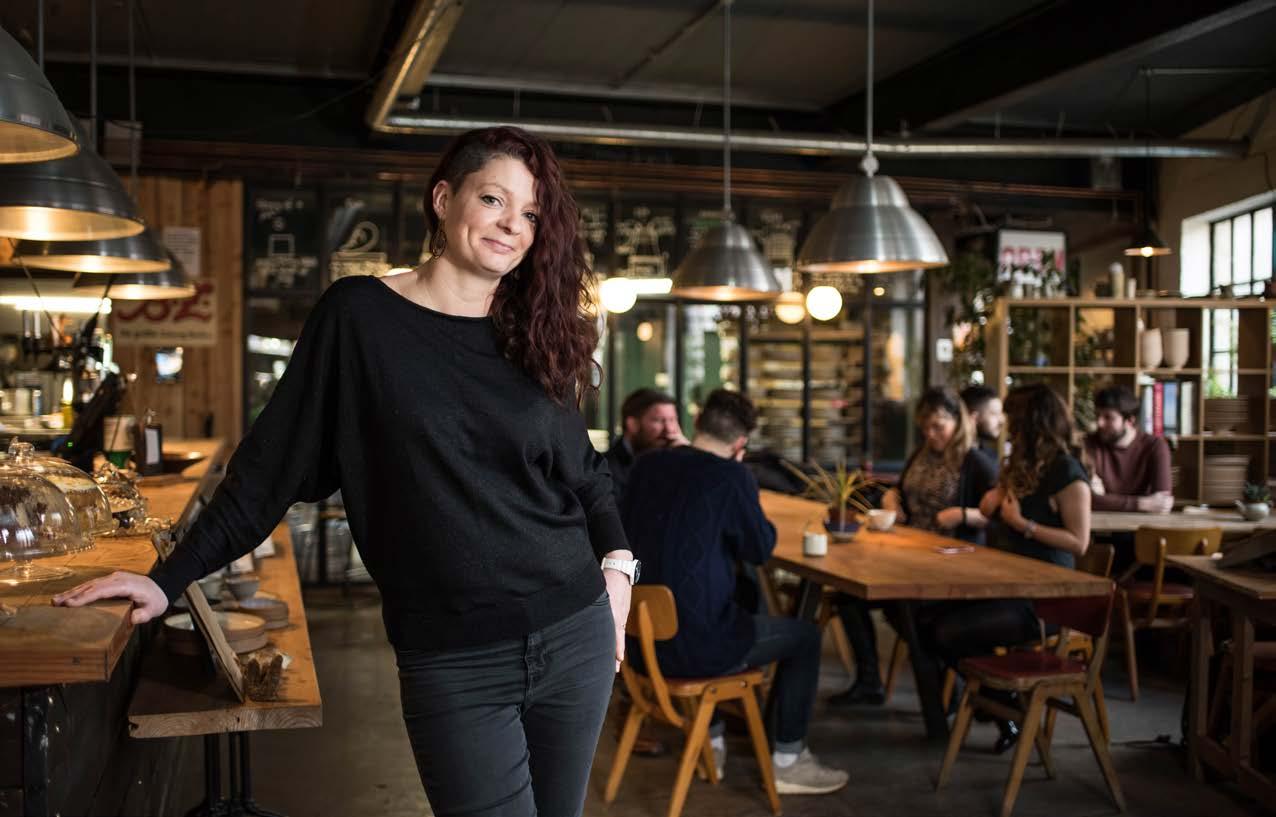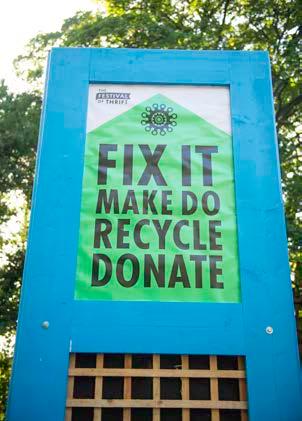
9 minute read
Get thrifty
Mastering the shift to thrift
It’s time for change. Nicole Wood chats to Emma Whitenstall, executive director at the Festival of Thrift to discuss festivals, sustainable living and the future of our planet...
Advertisement
What can you tell us about your route into the world of sustainability? Emma Whitenstall: My background is actually in the digital sector. I’ve been working to support creative, digital and tech businesses for the past 10 years and I love how vibrant and constantly evolving the scene is in the North East. I worked as both operations manager and executive producer for the Thinking Digital Conference for three years, bringing new and inspirational tech innovators and entrepreneurs to the region, and loved the buzz of a large-scale event. I then went on to manage the digital and creative business support programme for Generator and now work with Dynamo, supporting tech businesses - specifically in health tech through our cluster work. You might think this is all very random considering where I’ve ended up, but that digital background certainly came in handy when our 2020 festival went online. My role as executive director at the Festival of Thrift is essentially to ensure the sustainability of the festival itself, through fundraising, capacity building and robust governance.
What can you tell us about the Festival of Thrift? EW: The Festival of Thrift has been running since 2013 when thousands of people flocked to Darlington to experience inspirational speakers join forces with skill sharers and ethical traders, to help place creativity at the heart of our shared sustainable future and celebrate a new way of ethical living. We positioned artists as inspirers to action and to encourage change through workshops, exhibitions and performances. The first festival was a huge success and we have continued annually ever since, establishing Festival of Thrift CIC in 2015 with a mission to benefit the community and advance public awareness of sustainable living. Now based in Redcar, we reach new audiences from all over the UK year-onyear, building new partnerships with organisations who share our ethos.
How can our readers get involved in the Festival of Thrift? EW: Our focus has always been on how we as individuals can make those small changes. The shift to thrift can be something small that will add up to make a big difference for the future of our planet while encouraging others to join in. Whether that is coming to our green field festival in Redcar (25 - 26 September 2021 - COVID-depending) or engaging with our digital events and resources, we believe we can all celebrate sustainability and make a difference.
Receiving the Culture Recovery Fund is amazing news. I understand it has allowed you to continue to develop initiatives beyond the physical festival to keep sustainable living at the forefront of our minds - what do these initiatives entail? EW: 2020 was a year of challenge and change and we expanded our reach to take our message wider, not just to those who can join us at our beautiful green site in Kirkleatham, Redcar, but worldwide and online. The climate crisis is growing and we all need to take action now - in our backyards, in our living rooms, in our communities. So, we are no longer just an annual festival, (though we most certainly look forward to returning), but we are also becoming a campaigning organisation encouraging everyone to be a part of the solution - not part of the pollution. An example of this, is the Fix it Fortnight event that we ran in February, an interactive, digital programme that featured a host of online tutorials, debates, tips and tricks along with downloadable toolkits to support a more sustainable lifestyle. We also plan to focus on slow fashion and sustainable eating within the coming months.
How important is sustainable living to you? EW: Sustainability is something that has crept into my life slowly but surely, and came to a head about a year ago when I knew I had to do something to make a


difference. Just before the pandemic hit, I was on the verge of launching my own sustainable business. Unfortunately, the main aim of the business was servicing densely populated business parks and corporate offices and relied on a high concentration of people in one place. As you can imagine, COVID put an immediate stop to that idea - luckily before any heavy investment had been made, and the business was parked. A month later, I was working with the Festival of Thrift, so the path might not have been the one I was expecting, but it certainly brought me to the right place in the end.
How important is it that others adapt to a more sustainable way of living? EW: It’s absolutely critical, and as we champion at the festival, every small change makes a difference. But it’s crucial to remember that it is not just the responsibility of the individual and I think sometimes our guilt can be overwhelming if we think too much about it. We are constantly told that we consume too much plastic - but try doing your weekly shop at a supermarket without buying something wrapped in plastic - it can be difficult. Yes, we can shop in zero-waste stores or buy organic veg boxes from a local supplier, of which there are many wonderful options in the region, but it is still an exclusive option. With so many families relying on supermarkets, people are priced out of sustainable choices and this is another problem. We must create demand to drive down prices, but how can we do that if we can’t afford to create the demand? It’s time to put the responsibility firmly at the door of policy makers and manufacturers.
Your top tips for living a sustainable lifestyle? EW: There are so many tips and tricks - things you can change in day-to-day life, but it’s all about finding what works for you. One of the biggest impacts you can make is to change your energy supplier to a renewable energy provider. We switched to Octopus Energy last year and they are really leading the pack in terms of innovative service design and customer engagement. It was incredible to read that renewables have now overtaken fossil fuels as the main source of UK power, so it’s important we keep up that demand. We also reverted back to a milkman. How is it that decades ago, we had an electricpowered delivery of plastic-free refillables delivered to our doors at a reasonable price and we are only just circling back to that way of thinking now? Use your vote to make a difference - by voting for parties with green policies, we shift the political conversation, even if our party doesn’t get elected. And of course, we should all try to eat a more plant-based diet. I am in no way vegan or even vegetarian, but we have massively reduced our meat intake. Finally, educate yourself and tell everyone you know. I recently did a short course on the climate crisis with Aim Hi (the naturefirst, curiosity-powered online school - check it out) and I cannot recommend it enough. All the learning is backed up with academic research and verified, which is very important when you’re talking about this with others. Engage with the festival, join GreenPeace, go to an Extinction Rebellion rally - whatever resonates with you. Build your knowledge and share what you find.
our world leaders and policy makers to stand up and shoulder the responsibility that is theirs, to actually implement the drastic action that will make a difference. In order to achieve the rapid systemic change required, we need governments to be very proactive. COVID-19 changed the world almost overnight. We need an equally rapid response to the climate crisis.
If the power was in your hands, what changes would you make today that would create a positive impact on the planet for future generations? EW: Make a new world order with Greta Thunberg and Sir David at the helm!
It’s so empowering to see women, like yourself, working as executive directors leading the fight for sustainable living. What has your journey to success been like? EW: Oh, a winding path of crushing disappointments, unexpected turns and moments of total serendipity. I spent many years pursuing and failing to get roles within a digital agency, convinced that was where I belonged - only to be told time and time again that I didn’t have the right experience. I was looking for a change a while back and a chance conversation with a friend introduced me to Stella Hall, the creative director at the Festival of Thrift. I’ve always loved festivals and spent many a happy and hedonistic weekend at Glastonbury in my youth - and now with a young family, we regularly pack up the campervan and go to some great family festivals (or did!). We had a chat and Stella sparked an interest in me so I went along to the festival in 2019 and was completely blown away. I knew immediately I had to get involved and started on a freelance basis producing the talks programme, then lockdown happened and when the whole team took a complete pivot to online delivery in their stride, I knew this was where I wanted to be. The opportunity for executive director came up and as cheesy as it sounds, it felt like all the stars aligned. I was in no way presumptuous that I would get the role, in fact at one point I had decided against applying completely when the imposter syndrome kicked in with full force, but my husband pushed me on and thanks to him, I’ve really landed a dream role with a fantastic team.

In a recent article online, it was suggested that there’s an eco-gender gap and that ‘saving the planet’ is often marketed toward women. What are your thoughts on this? EW: Yes, there is, there is no denying it. Perhaps because up until now our mostly-male world leaders aren’t making it a priority? What I do know is that when producing the talks programme for the festival, every panel had a majority of women speakers, doing brilliant things to tackle the climate crisis head-on and champion sustainability in different ways - and hey, let’s celebrate that! It makes a stark contrast to the digital sector, which is quite the reverse. It was amazing to combine these areas for our Great Tech Debate in February as part of our Fix it Fortnight campaign, bringing wonderful women such as Susanne Baker from Tech UK and Ellen Wilson from Microsoft to speak about taking the lead on sustainability in tech.
And finally, what are your three luxe things in life? EW: My darling family - as much as there have been many moments during this pandemic where we all would quite happily live alone, I think about all the people who have done this alone and really count myself lucky. Our beloved campervan, who through one thing and another, has never had the summer of love it deserves, fingers crossed for 2021. And festivals - may they return in full force very soon to get this sector back on its feet, and so I can do some more dancing in a field!
festivalofthrift.co.uk






